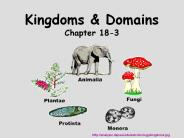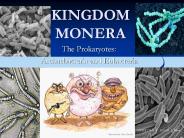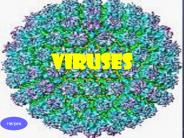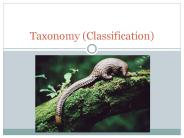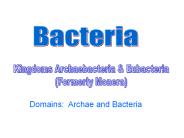Halophiles PowerPoint PPT Presentations
All Time
Recommended
The Biodiversity of halophilic prokaryotes Are there many more halophiles out there
| PowerPoint PPT presentation | free to view
... Find or capture food Fat for food storage Specialized cells Adapted to environment Archaebacteria Examples: Methanogens Halophiles Thermophiles ...
| PowerPoint PPT presentation | free to view
... Cell walls without peptidoglycan Subdivided into 3 groups based on their habitat --- methanogens, thermoacidophiles, & extreme halophiles Eubacteria Come ...
| PowerPoint PPT presentation | free to view
... Domain Archea Types of Bacteria 50 Points QUESTION: Halophiles use this to produce ATP ANSWER: Salt Bacterial Structures 10 Points QUESTION: ...
| PowerPoint PPT presentation | free to download
Facultative anaerobes. Obligate anaerobes. 46. OXYGEN. Obligate aerobic ... Facultative anaerobe ... Facultative Anaerobe. Obligate Anaerobe. 48. SALINITY. Halophiles ...
| PowerPoint PPT presentation | free to view
Hypotonic environment: Concentration of solute outside the cell is lower than ... Some bacteria like high salt concentration: halophiles ...
| PowerPoint PPT presentation | free to view
Bacteria that stain violet when exposed to gram stain What is Gram positive bacteria? ... Salt-loving Archaebacteria What are halophiles?
| PowerPoint PPT presentation | free to view
Thermoacidophiles: very hot and acidic. Halophiles. Thermophiles ... bacilli rod-shaped. cocci round. spirilla spiral / corkscrew. Materials in Cell Wall: ...
| PowerPoint PPT presentation | free to view
Euglena, diatoms, amoeba. Protista. E. Coli, Streptococcus. Eubacteria. Halophiles, methanogens ... A laboratory investigation included examining prepared ...
| PowerPoint PPT presentation | free to view
2. Bacilli rod-shaped. Spirochetes spiral-shaped ... Thermophiles: live in hot water. Halophiles: live with high salt. Great Salt Lake ...
| PowerPoint PPT presentation | free to view
Extreme or obligate halophiles require high osmotic pressure ... Multiple tube MPN (most probable number) test. Direct Microscopic Count ...
| PowerPoint PPT presentation | free to view
(convert hot, acidic gases into energy) Halophiles (convert salty water into ATP) ... 1) Rod-shaped are called Bacilli. 2) Sphere-shaped are called Cocci. ...
| PowerPoint PPT presentation | free to view
Nitrogen Fixation change nitrogen in the air to a form plants can use ... Halophiles - live in really salty lakes and ponds. Thermophiles - live in extreme heat ...
| PowerPoint PPT presentation | free to view
Found around hot springs near volcanic vents in the oceans. Extreme Halophiles ... Bacilli - rod-shaped. Usually forms chains. Have flagella at times to make ...
| PowerPoint PPT presentation | free to view
Identify the characteristics used to classify kingdoms. ... (thermophiles and halophiles), and nonextreme archaebacteria are three types of archaebacteria. ...
| PowerPoint PPT presentation | free to view
... high concentrations of salts, which results from the evaporation of water. ... Live in high saline environments. ... Results and Discussion ...
| PowerPoint PPT presentation | free to view
Archaebacteria and Eubacteria
| PowerPoint PPT presentation | free to view
Archaebacteria and Eubacteria What are bacteria? Bacteria are prokaryotes (no membrane bound nucleus) Smallest living known cells Found Everywhere Characteristics ...
| PowerPoint PPT presentation | free to download
The 6 Kingdom s Archaebacteria Found in harsh environments (undersea volcanic vents, acidic hot springs, salty water) Cell walls without peptidoglycan Subdivided ...
| PowerPoint PPT presentation | free to view
Archaebacteria and Eubacteria Sarita Bhatia Department of Botany, DAVCG, Yamunanagar.
| PowerPoint PPT presentation | free to view
The 6 Kingdom s Archaebacteria Found in harsh environments (undersea volcanic vents, acidic hot springs, salty water) Cell walls without peptidoglycan Subdivided ...
| PowerPoint PPT presentation | free to view
Microbial Growth Binary Fission Growth Rate Generation Time E. coli can double every 20 minutes Many Bacteria have 0.5-6 hr Generation Times Cell Division FTS ...
| PowerPoint PPT presentation | free to download
Archaebacteria and Eubacteria Sunita Kaushik Department of Botany, DAVCG, Yamunanagar.
| PowerPoint PPT presentation | free to view
The 6 Kingdom s Archaebacteria ... Eubacteria Staphylococcus aureus Bacillus anthracis E. coli Protist Eukaryotes Most are ... Store food energy as glycogen ...
| PowerPoint PPT presentation | free to view
Microbial Ecology 138023 Oded Beja Introduction Syllabus presentation What is microbial diversity? A two-credit course with one hour of lecture and one hour ...
| PowerPoint PPT presentation | free to view
How does temperature affect growth? ... ( Taken near the Dana Plateau in Yosemite National Park at about 12,000 feet elevation) ...
| PowerPoint PPT presentation | free to view
Kingdoms & Domains Chapter 18-3 http://analyzer.depaul.edu/astrobiology/kingdoms.jpg
| PowerPoint PPT presentation | free to download
Found in volcanic vents, hot springs, cracks on ocean floor that leak acid. Phylum Halobacteria ... Almost all are rod shaped. Used to produce fermented ...
| PowerPoint PPT presentation | free to view
CLASSIFICATION & 6 KINGDOM NOTES Why classify organisms? To organize the diversity of life To help us know what we are talking about Ex. Brown animal beaver or bison?
| PowerPoint PPT presentation | free to view
The 6 Kingdoms Classification Domain (recent addition)-Kingdom- Phylum -Class- Order- Family- Genus- Species 3 Domains Archaea Bacteria Eukarya 6 Kingdoms within the ...
| PowerPoint PPT presentation | free to view
Microorganisms that can survive and even thrive in conditions considered to be ... proteases (protein degraders) and lipases (grease degraders) not stable in high ...
| PowerPoint PPT presentation | free to view
Title: Control of microbial growth Author: SMCCCD Last modified by: Nick Kapp Created Date: 2/26/2003 9:30:05 PM Document presentation format: On-screen Show
| PowerPoint PPT presentation | free to download
KINGDOM MONERA The Prokaryotes: Archaebacteria and Eubacteria Methanogens These Archebacteria are anaerobes. They make methane (natural gas) as a waste product.
| PowerPoint PPT presentation | free to download
VIRUSES - Industrial ISD ... VIRUSES Herpes
| PowerPoint PPT presentation | free to download
Chapter 6 Microbial Growth What are Populations Colonies What are Populations Colonies Deep-freezing: -50 to -95 C Lyophilization (freeze-drying): Frozen (-54 to ...
| PowerPoint PPT presentation | free to download
Chapter 27 Prokaryotes and the Origins of Metabolic Diversity
| PowerPoint PPT presentation | free to view
Classification I. Carl Linnaeus Classification System 1. Taxonomy the science of naming organisms and assigning them to groups a. Similar structural ...
| PowerPoint PPT presentation | free to view
Bacterial Growth and Nutrition Bacterial nutrition and culture media Chemical and physical factors affecting growth The nature of bacterial growth
| PowerPoint PPT presentation | free to download
Thermal vents at bottom of ocean. extreme salt conditions (Great Salt Lake, Dead Sea) ... Brightly colored due to purple pigments (bacteriorhodopsin) ...
| PowerPoint PPT presentation | free to view
The kingdom Archaebacteria is relatively small, consisting of three main phylogenetic groups. ... Some are autotrophic - able to produce their own food. ...
| PowerPoint PPT presentation | free to view
Title: The Prokaryotes: Domains: Bacteria Archaea Author: Administrator Last modified by: Lisa Created Date: 4/13/2005 5:46:05 PM Document presentation format
| PowerPoint PPT presentation | free to view
Bacteria Structure and Function Prokaryote & Eukaryote Evolution Cellular Evolution Current evidence indicates that eukaryotes evolved from prokaryotes between 1 and ...
| PowerPoint PPT presentation | free to download
Universal Tree of Life Universal tree ids the roadmap of life. It depicts the evolutionary history of the cells of all organism and the criteria reveals 3 dimensions.
| PowerPoint PPT presentation | free to download
Taxonomy (Classification)
| PowerPoint PPT presentation | free to download
Extreme Biology - Budapest University of Technology and ...
| PowerPoint PPT presentation | free to view
Bacteria which thrive in areas of high salt concentration. Salt normally dehydrates organisms ... Cyanobacteria: autotrophic bacteria. Create oxygen for life on earth ...
| PowerPoint PPT presentation | free to view
rod shaped, Gram negative, lophotrichous. chemoheterotrophs. Pseudomonas ... Sulfolobus (hot springs of Yellowstone National Park) - oxidizes sulfur ...
| PowerPoint PPT presentation | free to view
Membranes become more fluid at ... Topt (oC) Growth temperature. Source. MIC321 L6.2003. Molecular mechanisms of ... N D model. DG comprises enthalpy and ...
| PowerPoint PPT presentation | free to view
Chapter 6: Microbial Growth
| PowerPoint PPT presentation | free to view
Live in extreme environments where there is no oxygen available (anaerobes) ... Classified by shape, nutritional needs, response to Gram-stain ...
| PowerPoint PPT presentation | free to view
Domains: Archae and Bacteria
| PowerPoint PPT presentation | free to download
Gram-negative bacteria generally more pathogenic than gram-positive bacteria: ... Decomposition of oil spills by soil bacteria. Metabolic 'factories': Organic solvents ...
| PowerPoint PPT presentation | free to download
Title: Lecture 2: Bacterial Polymerization Author: Greg Marczynski Last modified by: Shixue Yin Created Date: 8/10/2002 9:34:05 PM Document presentation format
| PowerPoint PPT presentation | free to view
University of Essex BIODEEP-WP4 Determination of the distribution, taxonomy and diversity of micro-organisms from DHABs, and isolation of strains with ...
| PowerPoint PPT presentation | free to view





























